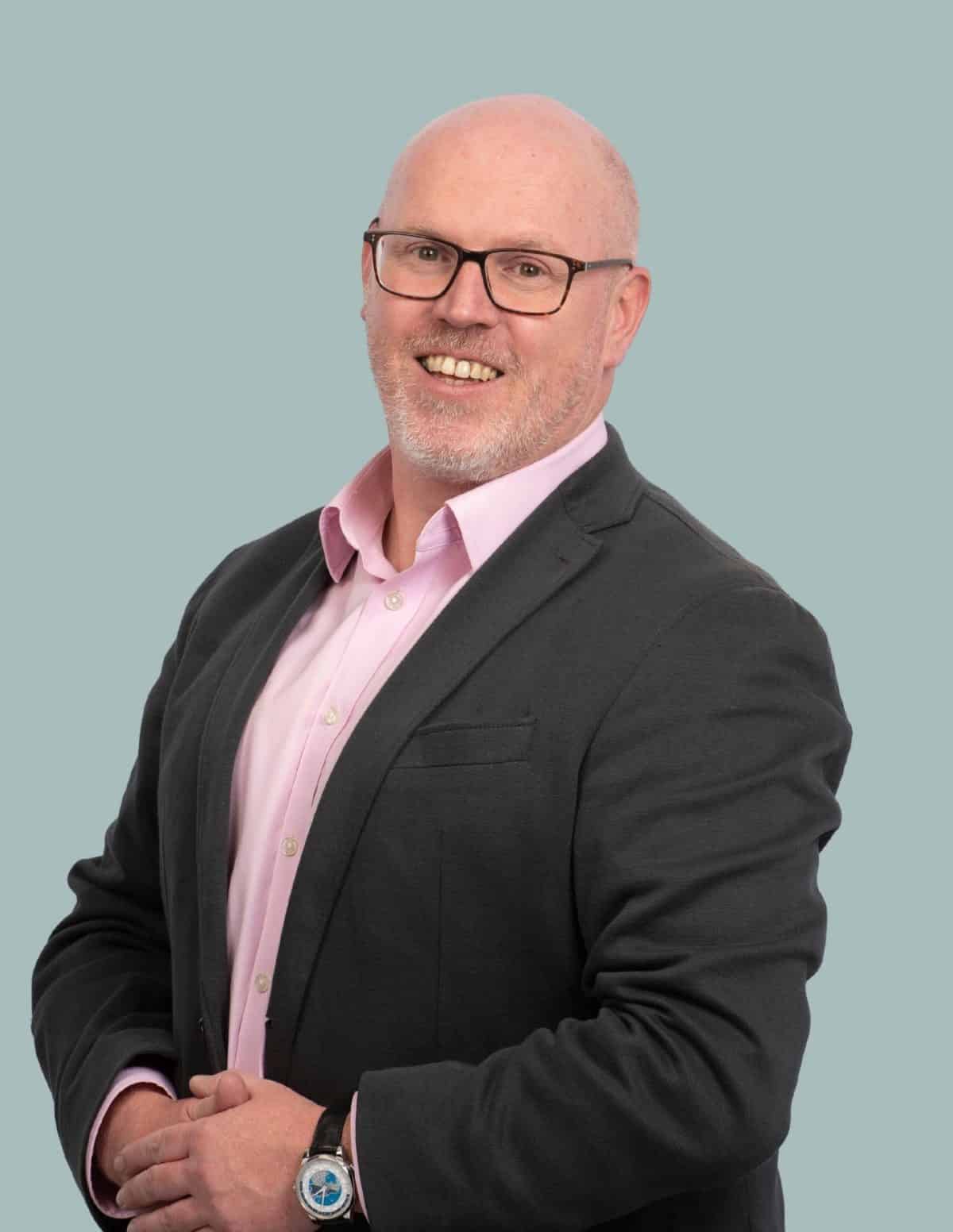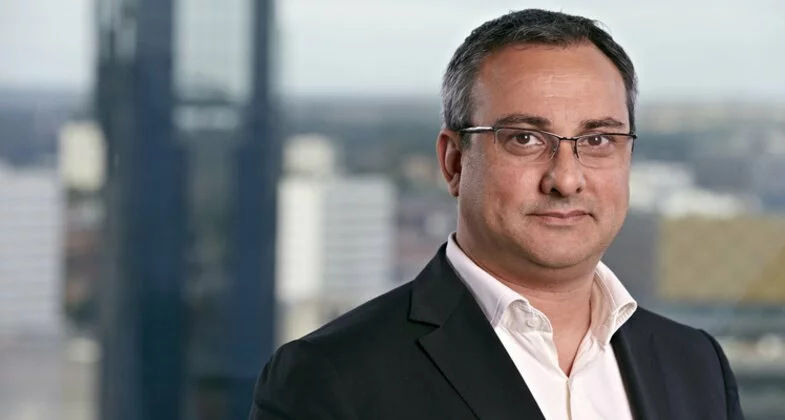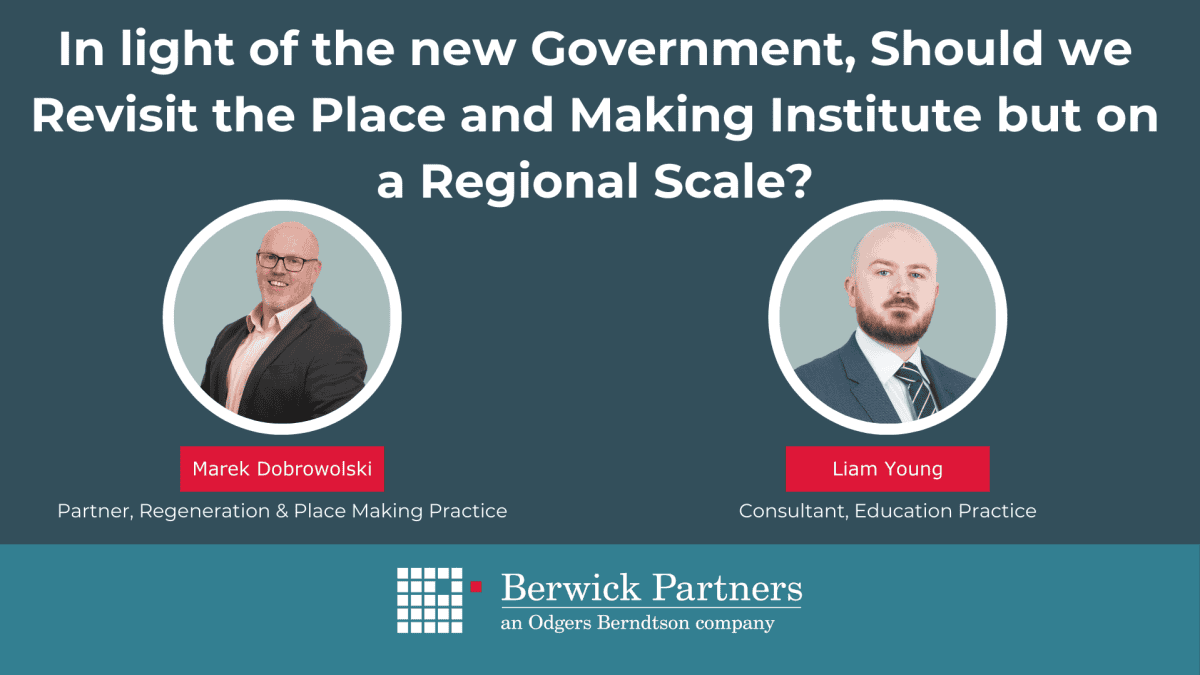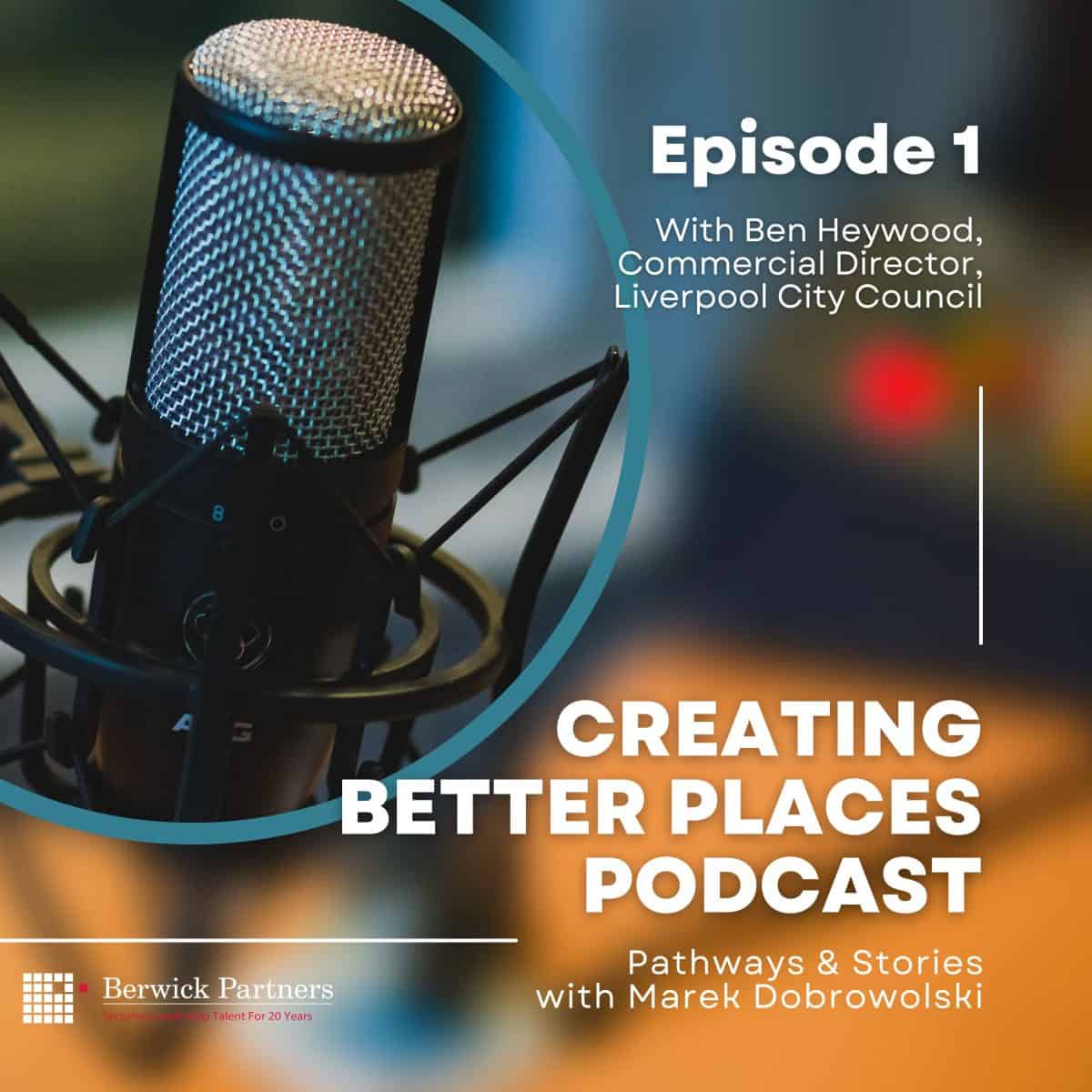Five minutes with…Neil Rami, Chief Executive of the West Midlands Growth Company
In our latest edition of ‘Five minutes with…’ Marek Dobrowolski, Partner and Lead for the Place & Regeneration practice at Berwick Partners, speaks to Neil Rami, Chief Executive of the West Midlands Growth Company and one of the most recognised and well-regarded figures in UK Economic Development.
I first came across Neil in the early 2000’s when I was starting out in headhunting. Working on what was then an assignment to find the CEO of Marketing Birmingham, everyone was talking about the chap from Northern Ireland who was re-inventing how the world viewed Tyneside. Roll forward six years and Neil was being talked of as the guy who was re-inventing how people viewed Birmingham, and more, was now looking at how the city changed its economic story and attracted not just visitors, but jobs, investment and growth.
It was also the time at which he became my boss, and for five years I witnessed first-hand the evolution of Marketing Birmingham under his leadership into, what is now, the West Midlands Growth Company.
We took the chance for a long overdue catch up, talked about that journey, his views on the critical roles economic development agencies play in Place Making, and what the future possibly holds for the West Midlands at one of the most exciting times in its history.
You came into this as a place marketeer and it’s now morphed into broader economic development, so I’m interested in your own personal journey through that and how in some ways you’ve shaped the organisation, particularly the West Midlands Growth Company and Marketing Birmingham before that.
All places evolve, and I guess regeneration is also a process of evolution. My view is that the organisations that serve those places need to evolve as well. The job at that time, when I first came to Birmingham, was very much a place marketing job. My current role, and the organisation I have been lucky enough to lead, has now evolved so that it can better support the region, so that it’s now very much a role focussed on ensuring our international competitiveness.
What we’ve learnt even before the pandemic, but certainly during it, is that with all the geo-political changes in the world, and the impact of Brexit, building what we describe as gear-shift projects, or investable propositions that allow the region to differentiate itself, is essential. We have to create sticky assets. Therefore, what we do and what I now concentrate on is much more than a marketing job – it’s an insight, analysis, and proposition-based exercise. Both for inward investment and tourism.
I think the other thing to say is that we’ve known for some time that regions like the West Midlands cannot rely on Government support alone to sustain their futures – they’ve got to build a strong pipeline off private investment capital. That’s very much the third string to our bow that we’ve developed as an organisation over the last three years, and potentially will become one of the most, if not the most, important things we do.
One area that I now spend much more time considering is the inclusive growth ambition that the politicians have quite rightly set for the region. How do we tackle that with potentially less resources from central government? For me, it’s essential that we find and work with investment partners that share our values and are prepared to take a long-term view and understand that we must all float on the same tide.
From a corporate perspective, I believe in the concept of an infinite business, an organisation that keeps evolving. So, taking the Growth Company as an example, yes – we’re a public-private partnership, yes – we’re a publicly owned entity, but we need to operate like a business. We need to respond to the market as it evolves in a commercially minded way to be able to deliver real social value and change. We’re always seeking new ways to adapt our business model to generate the strongest returns for our shareholders and ultimately the region.
How easy has it been to do that? You’ve got lots of different organisations in this space, so how easy has it been to create the growth company with the span of influence that it’s got?
These things are never easy, if they were, everybody would be doing it! I think there’s one fundamental difference for us – in a sense the rationale for the West Midlands Combined Authority is similar to the rationale for the Growth Company. To make a difference and to add value to what happens at a local level, you need some form of body or organisation whose remit and focus is to be strategic and can operate and deliver at scale. Whether that’s transport or skills, someone needs to have the remit for doing that at scale.
Certainly here, in the West Midlands, and if you look internationally at where regions are effective in this space, then there’s an acceptance by public and private partners (and indeed our higher education partners, who are also our shareholders in this venture) that there is some kind of green or clear space, as it were, for an organisation to operate in.
There have been some greyer areas: key account management for example. How should we engage with major employers when 70% of all inward investment comes from your existing employment base? Are we horizon scanning their landscape post pandemic; skills shortages, supply chain issues; near or re-shoring etc.?
Every region has complex ecosystems, and the West Midlands is no different. My view is that this region operates much better together at the strategic level than perhaps we give ourselves credit for. At the Growth Company we still remain very focussed on our core purpose around investment and visitors. Our track record, credibility, and expertise now means that the opportunities to develop and grow are enormous. It is exciting for me as CEO and anyone considering joining us.
Throughout your career, you have worked in many of the UK’s major cities, including Liverpool, Newcastle, and Birmingham. Lots of people talk about a city’s moment in time, usually underlined by a major investment for development that seemed to act as a catalyst. For example, Newcastle when it got Sage, Liverpool when it did the Docks, Belfast with Titanic. Not all cities seem to build on that moment in time. Is that the real challenge? How do we ensure that moment in time becomes more than just someone’s memory attached to a particular development? How do you keep a city still relevant, so it doesn’t get stuck at a particular time?
I think every city must respond to the context of the time that it’s in. Birmingham has done that particularly well in terms of its city centre regeneration and our other great cities, Wolverhampton, Coventry, are also now firmly in that mode. If you look at the regeneration of Birmingham as a post-industrial city, it probably started 40 years ago, with the NEC being created and a recognition by the civic authorities that we needed to diversify. But you’re right, it tailed away. Arguably, that’s why you must identify when the context you are in is changing, and what you need to do to adapt.
I also take the view that the death of cities is much vaunted by various economists and academics. The reality is, if you look at the history of this country and in fact probably the world, productivity gains and innovation only really happen when people come together in dense communities, which is what we are as cities.
For Birmingham, part of the challenge is sometimes it’s innovated and developed without acknowledging it itself or telling anybody else what it’s been doing. We were successful in attracting the Commonwealth Games, not because it was a regeneration catalyst, but because we had over 90% of the infrastructure already in place, and we had already attracted some 30 world and European sporting championships in the last 15 years.
What we hadn’t done was make that known to the world, and therefore the next phase of development for Birmingham and for Coventry and Wolverhampton (because they are all quite unique) is to ensure that what we do well and where the opportunities lie in this region, are understood at an international level.
To answer your question directly, I think the next phase is internationalisation.
Despite some of the nationalism and economic populism that we’ve seen around the world over the last few years, I don’t think globalisation can really be put back in its box. Birmingham by its nature and its demographics, is an international place, so we’ve really got to make more of the opportunities we have out in the commonwealth markets. Particularly developing stronger trading, and civic and cultural relationships.
It’s hugely competitive for investment and growth, so what do you think the West Midlands has done to be competitive and what do cities and regions need to be competitive in this world of globalisation?
If you talk about regeneration, good regeneration responds to the context. We’re in a period now of what has been described to me recently as ‘intentional repurposing,’ – we’re changing our cities to respond to the way people are working differently i.e., a shift in retail, younger demographics, hybrid working, more tech savvy and so on. That’s intentional repurposing.
Great regeneration anticipates the future. I don’t think this is unique to Birmingham, many cities across England now are really asking themselves what kind of place they want to be. The race to net-zero is part of that, but sustainability is much more than a net-zero game, and everybody is beginning to realise that we still have pockets of polarised unemployment and disadvantage across Birmingham like Coventry, Manchester and other cities.
What are we going to do that will change the dial there? In a sense, if the 90s and 2000s were about city centres, I think the next 20 years will be about the donut that’s around those city centres. We are very mindful of that and from an investment perspective, I also believe the clever investors are also recognising that with the ESG agenda and so on.
It’s a phenomenal couple of years for the West Midlands (HS2, HSBC, Goldman Sachs, Commonwealth Games), and you’ve got these couple of roles to come and work right in the heart of that, so what are the next couple of years going to be like and what’s the challenge and the legacy for the West Midlands after these major events that you and I have been talking about and actually working on for the best part of ten years, once they arrive?
I always work on the basis that with the big set piece infrastructure developments and indeed major events themselves, it’s important that we begin to think about legacy and what’s next from the moment we secure them, rather than the moment they arrive.
We’ve been on this journey for years, beyond HS2, beyond the Games, beyond 5G, beyond some of those big investments that you mentioned. IHS2 is the perfect example. You’re looking at a huge supply chain of companies now that are harnessing that already, and the stations that are not yet open, but are major regeneration catalysts in their own right – it’s now very real.
To answer to your question about legacy and the future, it is never going to be one thing.
If you take major events for example, we’re already working on, what we believe, is the shortlist of all the things to go for over the next 10 years, so we’re already pitching for events three, four or even five years ahead.
My personal view is that the future might not be as much about inward investment per se, it will be about organic growth. I think the next big thing will be, what’s the next GymShark? Where’s the next IPO? Who’s our next unicorn? Our future will be home-grown and the reason for that is the investment climate has matured and people are prepared to invest in this region, in a way that they wouldn’t have before. People invest in people, and we’ve proven that this is a place that gets things done and generally delivers on its promises.
I’ve talked about how Birmingham and the West Midlands used to be a place you travelled through in your career, you came for a job and then moved on. The region is now becoming much more of a positive career choice and indeed a life choice. Home grown successes will only help build that appeal.
The final thing I’d say about investing is that the most successful cities are those that invariably become the most liveable places – a place to live, learn and earn, if you like. We’ve seen that quality-of-life metrics are becoming much more important factors in investment decisions. I think we’ve all learned from the pandemic that our own ‘fifteen-minute communities’ are important to us and where we live and how we live our lives are clearly going to be even more important for the next generation.
For me that’s part of the next challenge – how do we make sure that this is one of the most liveable places.
Marek Dobrowolski leads our Place Practice nationally. His focus is on Regeneration, Economic Development & Infrastructure appointments in Local Government and its associated agencies.






